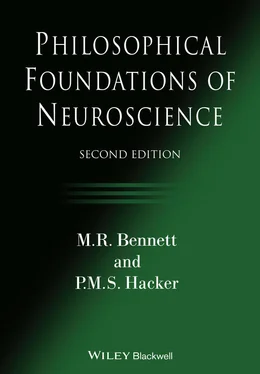The mind vanishes when the highest brain mechanism ceases to function due to injury or due to epileptic interference or anaesthetic drug. More than that, the mind vanishes during deep sleep.
What happens when the mind vanishes? There are two obvious answers to that question; they arise from Sherrington’s two alternatives – whether man’s being is to be explained on the basis of one or two elements. ( MM 81)
Penfield thought it preposterous to suppose that the mind is merely a function of the brain, and so ceases to exist when it ‘vanishes’ in sleep or epileptic automatism and is re-created afresh each time the highest brain mechanism functions normally. Rather, he concluded, the mind is ‘a basic element’, and has a ‘continuing existence’. ‘One must assume’, he wrote, ‘that although the mind is silent, when it no longer has its special connection to the brain, it exists in the silent intervals and takes over control when the highest brain mechanism goes into action’ ( MM 81). So, the highest brain mechanism switches off the power that energizes the mind whenever one goes to sleep, and switches it on again when one awakens.
Is the explanation improbable?, Penfield queried.
It is not so improbable, to my mind, as is the alternative expectation [explanation] – that the highest brain mechanism should itself understand, and reason, and direct voluntary action, and decide where attention should be turned and what the computer must learn and record, and reveal on demand. ( MM 82)
Penfield’s neo-Cartesianism
Penfield’s neo-Cartesianism is no advance over that of Sherrington and Eccles. But if we are to learn anything from his errors, we must not simply dismiss them as misguided and move on to other matters. That will merely ensure that we learn nothing from his endeavours. We must ask what went wrong, what drove one of the greatest neurosurgeons and neurologists of all times to embrace such a misconceived view of the mind and brain?
Shared presuppositions
(1) The Cartesian conception of the mind
It should be noted that there are at least two fundamental presuppositions that Penfield shared with Sherrington and Eccles. The first was a Cartesian conception of the mind. Like Descartes, Penfield conceived of the mind as an independent substance (or, as he puts it, ‘a fundamental element’ that has ‘continuing existence’). Like Descartes, he identified the person, the ‘I’, or the ‘self’ with the mind, rather than with the living human being. Like Descartes, he took the mind to be the bearer of psychological attributes, 25and consequently conceived of human beings as subjects of psychological predicates only derivatively. And, like Descartes, he took the mind to be a causal agent that can bring about changes in the body by its actions.
(2) The assumption that the question of whether brain mechanisms can account for the mind is an empirical one
The second presupposition is that the question which so deeply disturbed him – namely, whether brain mechanisms account for the mind, whether the mind can be explained by reference to what is known about the brain – is an empirical question. Like Sherrington, Penfield conceived of the matter as a choice between two different empirical hypotheses. Either we can explain everything the mind does – for example, thinks and believes, reasons and concludes, has wants, forms intentions and purposes, and decides to act – by reference to neural states and events, or we must conceive of the mind as an independent substance in immediate causal interaction with the brain, and hence with the body. The choice between these two hypotheses is to be determined by the evidence that supports them severally and by their relative explanatory powers.
Criticisms of Penfield’s presuppositions :
(1) Misconceptions about the nature of the mind
Both presuppositions are misconceived. The mind, as we have already intimated, is not a substance of any kind. Talk of the mind is merely the form in which we represent to ourselves human powers and their exercise and talk about human powers and their exercise. We say of a creature (primarily of a human being) that it has a mind if it has a certain range of active and passive powers of intellect and will – in particular, conceptual powers of a language-user that make self-awareness and self-reflection possible. The idioms that involve the noun ‘mind’ have as their focal points thought, memory and will. And they are all readily paraphrasable into psychological expressions in which the word does not occur (we shall discuss this matter in some detail in §4.8).
A person is not identical with his mind. A mind is something ( but not some thing ) a person is said to have , not to be . In having a mind, an animal (that is thereby also a person, and a bearer of rights and duties) has a distinctive range of capacities. And it is obvious both that an animal cannot be identical with an array of capacities, and that if a human being loses enough of those distinctive capacities, he can cease to be a full-blooded person (and exist only in a ‘vegetal state’). It is not the mind that is the subject of psychological attributes, any more than it is the brain. It is the living human being – the animal as a whole, not one of its parts or a subset of its powers. It is not my mind that makes up its mind or decides; it is not my mind that calls something to mind and recollects; and it is not my mind that turns its mind to something or other and thinks – it is I, this human being. Hence, too, the mind is not a causal agent that brings about changes in the body and its limbs by its actions. On the contrary, it is human beings that deliberate, decide and act, not their minds.
(2) Whether the brain can ‘account for’ the mind is not an empirical question
Consequently, Penfield’s second presupposition is misguided. Whether we can ‘account for the mind’ in terms of the brain alone, or must account for the (supposed) activities of the mind (e.g. thought, reasoning, wants and purposes, intentions and decisions, voluntary and intentional actions) by reference to the mind itself, conceived of as an independent substance and therefore causal agent, is not a matter of choice between two empirical hypotheses. If these were empirical hypotheses, then either could in principle be true; that is, both would present intelligible possibilities, and it would be a matter of empirical investigation to discover which is actually the case. But that is not how it is at all.
It is neither the brain nor the mind that is the subject of psychological attributes
First, it is not the mind that thinks and reasons, wants things and has purposes, forms intentions and makes decisions, acts voluntarily or intentionally. It is the human being. We do indeed characterize someone as having a clear, rigorous or decisive mind. But these are merely ways of characterizing his dispositions in respect of thought and will. If we want to understand why a normal human being reasoned the way he did, thought what he did, has the goals and purposes that he has, and why he decided as he did, formed such-and-such intentions and plans, and acted intentionally, no neurological account will clarify for us what we wish to be clarified. To this extent Penfield was right. Where he was wrong was in the supposition that what we need is an explanation in terms of the activities of the man’s mind – where the mind is conceived of as an agent with causal powers. Rather, what we want is an explanation in terms of his reasoning, hence too by reference to what he knew or believed, and, in the case of practical reasoning, by reference to his goals and purposes. And if our explanation renders his reasoning intelligible, no further information about neural events in his brain can add anything. All a neural explanation could do would be to explain how it was possible for him to reason cogently at all (i.e. what neural formations must be in place to endow a human being with such-and-such intellectual and volitional capacities), but it cannot rehearse the reasoning, let alone explain its cogency.
Читать дальше












